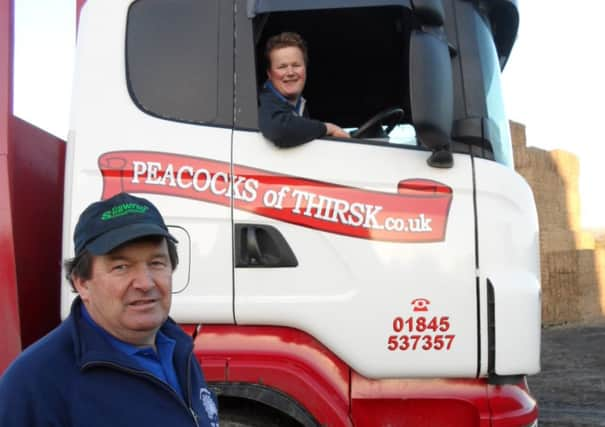Wagons rolling from East to West


Autumn always sees an exodus of heavy-laden trucks hauling hay and straw from Yorkshire to Cumbria, Lancashire and the south west of Scotland. You will have seen them and may often have been in awe, or perhaps fear of the way in which they are stacked.
For many years the annual business of transporting from the east to the west has become a vital part of providing bedding for animals over the winter. During the inclement spring this year there was an even greater demand from stockmen.
Advertisement
Hide AdAdvertisement
Hide AdIt was a time when those with the product could have inflated their price to take advantage of customers.
Fortunately, many hay and straw companies are run by farmers. Brian Peacock started his business, Peacocks of Thirsk, nearly 30 years ago. He has three trucks and is very much in the vanguard of the east to west exodus.
“Earlier this year when the weather went the way it did we heard of one or two charging considerably more than the market price but that’s not how we go about our business. We certainly don’t think of ourselves as opportunists in that way.
“We’ve maintained good relationships with our customers right since we started. Our principles are in providing a good dry product at a competitive price and being extremely reliable.”
Advertisement
Hide AdAdvertisement
Hide AdWhile Brian and his son Roger produce a substantial amount of hay and straw from their farm at Leake Hall on the A19 near to Knayton they also buy a good deal of straw in the swath to bale up and sell to customers in North Yorkshire, Cumbria and the south west of Scotland, particularly around Dumfries and count the Scottish Agricultural College among their customers.
Supplying straw is all very well if you’ve produced it yourself and have it on-farm but if you don’t and there is a run for more then you have to source it from elsewhere. That’s where the east to west movement each year really comes into its own.
“We can’t source enough locally as where we are there are a lot of livestock farms that are also looking to use their own straw for animal bedding. That means we have to go further east where there is less livestock kept. Consequently our wagons are often seen in the Wolds and down into Holderness. We pick up from villages such as Burton Pidsea and Patrington and even get as far as within a short distance of Spurn Point.
“It’s a two-hour drive from here to there, then there’s an hour for loading, then however many hours it takes to get to the south west of Scotland. It’s quite a long day and means that our drivers often need stop-overs.”
Advertisement
Hide AdAdvertisement
Hide AdHaylage is also a major part of the business and the Peacocks grow 400 acres of grass specifically for the horse haylage market.
“We started making haylage about 20 years ago and have now grown to making thousands of bales.” But Brian is quick to point out that he’s a farmer first and foremost. He, his wife Pat and son Roger are the third and fourth generations following on from his father George and grandfather Eddie.
“The family has been here around 70 years and the home farm runs to 200 acres. We have an additional 500-600 acres let on short term tenancies and grow predominantly grass but also cereals that we feed to our livestock.
“We fatten 300-350 cattle a year, mainly black and white bulls that go to Thirsk market or to ABP York and we have a herd of Shorthorns that go to the quality beef scheme at Woodheads.”